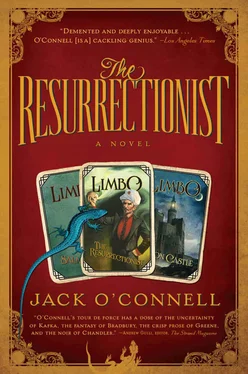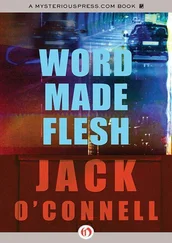Jack O'Connell - The Resurrectionist
Здесь есть возможность читать онлайн «Jack O'Connell - The Resurrectionist» весь текст электронной книги совершенно бесплатно (целиком полную версию без сокращений). В некоторых случаях можно слушать аудио, скачать через торрент в формате fb2 и присутствует краткое содержание. Год выпуска: 2009, Издательство: Algonquin Books, Жанр: Современная проза, на английском языке. Описание произведения, (предисловие) а так же отзывы посетителей доступны на портале библиотеки ЛибКат.
- Название:The Resurrectionist
- Автор:
- Издательство:Algonquin Books
- Жанр:
- Год:2009
- ISBN:нет данных
- Рейтинг книги:4 / 5. Голосов: 1
-
Избранное:Добавить в избранное
- Отзывы:
-
Ваша оценка:
- 80
- 1
- 2
- 3
- 4
- 5
The Resurrectionist: краткое содержание, описание и аннотация
Предлагаем к чтению аннотацию, описание, краткое содержание или предисловие (зависит от того, что написал сам автор книги «The Resurrectionist»). Если вы не нашли необходимую информацию о книге — напишите в комментариях, мы постараемся отыскать её.
those who create them and those who consume them. About the nature of consciousness and the power of the unknown. And, ultimately, about forgiveness and the depth of our need to extend it and receive it.
The Resurrectionist — читать онлайн бесплатно полную книгу (весь текст) целиком
Ниже представлен текст книги, разбитый по страницам. Система сохранения места последней прочитанной страницы, позволяет с удобством читать онлайн бесплатно книгу «The Resurrectionist», без необходимости каждый раз заново искать на чём Вы остановились. Поставьте закладку, и сможете в любой момент перейти на страницу, на которой закончили чтение.
Интервал:
Закладка:
They sat quietly for a while and he tried to think.
“I’m so sorry,” he said. “This is pathetic. I feel awful.”
He put a hand over his face and squeezed his eyes shut. He heard her say, “This is my fault. I was being presumptuous.” Then he felt her pulling his wrist away from his face. He opened his eyes and saw her nails were painted a deep rose.
“Can you give me five minutes?” he said and she started to protest.
“Oh, no. That’s not necessary.”
“I think,” he said, “maybe it is. I should get out of this place for a while and eat some real food and talk to someone who can talk back.”
“Are you sure you’re up to it?” she asked.
“Give me five minutes,” he said and stood up. “I’ll meet you out in front.”
He held up his hand and splayed his fingers. “Five minutes,” he repeated. “And I promise I won’t forget.”
She looked at the gashed palms and smiled and said, “I’ve got a better idea.”
18
To get to the Peck residence from inside the Clinic one had to walk a long corridor off the third floor that bridged the main house to the east wing. There were no rooms off the corridor and no windows, just one narrow, tunnellike expanse piled with discarded rehab equipment. Everything was old and bulky-looking, wooden wheelchairs and tarnished brass walkers and even a few bell jars. Behind a mattress that was leaning against the wall, Sweeney spotted several prosthetic legs.
Alice had her key out before they got to the door.
“There’s a separate entrance from outside,” she said. “Normally, that’s what I’d use. I like some division between work and home. But with the rain and all. .”
She let the sentence trail off as she tried to work the lock.
“Can I help you with that?” Sweeney asked as she turned the bolt and opened the door onto a large, dome-ceilinged room. Sweeney crossed the threshold first. Alice snapped on the lights and locked up behind herself.
The room was a library, the walls book-lined and the floor covered with an enormous Indian rug over dark hardwood. The furniture was antique but masculine — English club chairs and a big Kipling desk devoid of photos or knickknacks, except for a glass terrarium in which a salamander sat so rigidly that for a second Sweeney thought it was made of porcelain.
“My father’s study,” Alice said.
“That would have been my guess,” Sweeney said.
“He’s out tonight. He still lectures at the med school.”
He nodded and looked past her. Behind the desk, on the only wall not given over to shelving and books, was an oil painting, a formal portrait, dark and severe. The woman depicted was blond and a bit too fragile to be called beautiful. Sweeney looked from the painting to Alice and said, “Your mother?”
“My mother,” Alice said. “She died when I was a child.”
There was a credenza stationed beneath the portrait, and on top of it, a row of books, thick volumes, uniformly bound in red leather. Sweeney read the gilt titling on the spine and saw they were all copies of the same text— Perchance to Wake: On the Causes and Treatments of Coma. By W. Micah Peck.
“What’s the W stand for?” Sweeney asked.
“William.”
“What’s he got against the name William?”
“Only his parents called him William,” Alice said. “We should really go downstairs. My father doesn’t like people in his study.”
Sweeney followed her out of the room and down two flights of a semigrand staircase to the first floor. In the foyer, they came upon a small, wide woman struggling into a yellow rain slicker. There were two bulging plastic bags resting near her feet.
“Maneja con cuidado, Lucila,” Alice said.
The woman pulled a hood up over her head and lifted her bags.
“El cordero está en el horno,” she said. “ Te veo el lunes.”
Alice opened the front door for her and Sweeney could see the storm had picked up. The woman ran out to a battered Volvo in the driveway. Alice waited until Lucila was in the car before she closed the door.
“Our housekeeper,” she said. “She’s from Miravago.”
She led him to the dining room, talking as she went.
“Her people disappeared years ago. Father and I are all the family she has left.”
The dining room was small and, like what he’d seen of the rest of the house, dark and Victorian. A hearth on the interior wall had a fire blazing in it.
“But she doesn’t live with you?” Sweeney said.
“She’s got a place in the city,” Alice said, and then put a hand out toward the table. “Sit. Get comfortable. I’ll be right back.” She started for the door, stopped, and turned back to him. “Do you eat lamb?”
“Lamb’s great,” Sweeney said. “Thank you. This is really nice of you.”
“I eat alone much too often,” she said and moved into the kitchen.
Sweeney walked to the hearth, thought about taking the poker and stoking the logs, but found himself, instead, studying the paintings that lined the walls. They were all portraits, all done in the same style as the one in the study, some of them, maybe, done by the same artist. The house, Sweeney realized, looking at all the pale and bony faces, was a museum to the Peck gene pool. There was probably a historical register up in Daddy’s library that would trace a fairly straight bloodline of doctors and scientists. A few founders of cities and banks with maybe a hemophiliac or two dangling from the family tree.
He heard the clatter of china and then Alice backed her way into the room, pushing through the swinging door. She was carrying a serving tray that held plates, glasses of wine, and napkins full of silver. She placed the tray on the table, said, “Be right back,” and vanished again into the kitchen.
Sweeney inspected the meal. A single, overlarge lamb chop was on each plate, and he knew they’d been cut from a full rack. Each chop was drizzled with a brown glaze and accompanied by a few tiny red potatoes, three stalks of asparagus, and a spoonful of mint jelly.
Alice returned with quilted placemats and a large box of stick matches. Sweeney hadn’t seen matches like these in years. She set their places, transferred the plates and crystal from the tray to the mats, removed the tray to a sideboy, and lit two candles that rested in simple pewter holders at the center of the table.
“I hope the wine is okay,” she said.
“I’m sure it’s fine,” Sweeney said.
Alice smiled, motioned for him to sit, and said, “No, I mean, I know you’re working later.”
“Actually,” Sweeney said. “I’m off tonight. Unless you heard something different.”
“No,” she said. “I don’t make out the staff schedules.”
He couldn’t tell if she was joking. They sat down and he raised his glass to her.
“Thanks again.”
“You’re welcome,” she said. “Honestly, it’s a pleasure to have some company. Half my meals, I read patient files.”
He cut a piece of meat and put it in his mouth. It was tender but flavorless and he wondered what was the purpose of the glaze.
“This is delicious,” he said.
Alice nodded, finished chewing, and said, “Lucila is a marvelous cook.” She took a sip of wine and added, “There’s more in the kitchen.”
Sweeney speared a potato and glanced around the table for a salt or pepper shaker. There were none.
“You’ve lived here your whole life?”
“I was raised here,” nodding and sipping. “I went away for college and medical school.”
“You always knew you wanted to be a doctor?”
“It’s in the blood,” Alice said.
“I know what you mean,” Sweeney said. “My father was a druggist. That’s what he always called himself — a druggist. And my wife was one also. But the tradition comes to an end with me.”
Читать дальшеИнтервал:
Закладка:
Похожие книги на «The Resurrectionist»
Представляем Вашему вниманию похожие книги на «The Resurrectionist» списком для выбора. Мы отобрали схожую по названию и смыслу литературу в надежде предоставить читателям больше вариантов отыскать новые, интересные, ещё непрочитанные произведения.
Обсуждение, отзывы о книге «The Resurrectionist» и просто собственные мнения читателей. Оставьте ваши комментарии, напишите, что Вы думаете о произведении, его смысле или главных героях. Укажите что конкретно понравилось, а что нет, и почему Вы так считаете.












